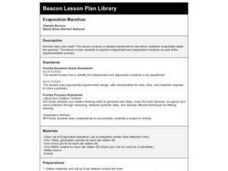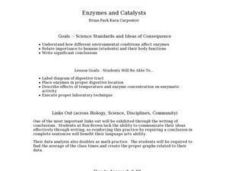Curated OER
The Reasons for the Seasons
Young scientists use a globe and a light to simulate the rotation of the earth and sun to show the seasons. Additionally, they simulate direct sunlight and indirect sunlight showing intensity of the sun, and answer questions based on...
Lesson Plans
Analogy of the Cell Project
Intended to supplement your existing cell function and organelle lessons, pairs work together to develop a real-world analogy for cell structures. In addition to writing paragraphs about the comparison, each group will make a short...
Lesson Plans
Student Info
Inform your instruction with information about your pupils. These student information pages will help you gather data about your classes. The first page focuses on educational history and preferences and the second asks for contact...
Curated OER
USING YEAST AS AN ULTRAVIOLET LIGHT MEASUREMENT TOOL
Learners realize the importance of organisms as standards of measurement and experimentation.The first lab is a simple survival curve that demonstrates the effects of UV light on cells. The second lab looks at repair mechanisms of the...
Curated OER
Evaporation Marathon
Pupils review the steps of the scientific method and participate in a three day experiment. They observe water evaporation over time.
Curated OER
The Microscopic World
Students identify magnification by first using a magnifying glass and then with photos taken through a microscope. They complete a handout that leads them through each activity stated. Finally, students use their microscope to view a...
Curated OER
Have You Ever Seen a Sea Monkey?
Fourth graders observe brine shrimp over several days. They create drawings showing the growth and development of the shrimp. They research web sites to find out where brine shrimp fit on the food chain and what makes the shrimp unique.
Curated OER
Radioactive Samples
Students examine the different types of radioactivity. In this radioactive samples lesson students complete a lab activity on radiation and complete a handout.
Curated OER
Momentum and Energy
Students study how to calculate momentum, kinetic, and potential energy. They apply each form of energy to real world situations including demonstrations, watching videos, and designing a Power Point presentation. They investigate in...
Curated OER
Petri-fied of Bacteria
Young scholars examine the existence of bacteria all around them and consider the roles, both positive and negative, that bacteria play. Over a period of several days, students conduct an experiment in which they predict, determine, log,...
Curated OER
The Celestial Sphere and Circumpolar Motion
Students investigate the celestial sphere and circumpolar motion. In this science lesson, students view an applet, The Celestial Sphere and Circumpolar Motion. Students discuss the Earth's rotation and stellar movement.
Curated OER
Solar System
Students research the nine planets on the internet using the provided links. They also search for pictures of each of the nine planets and use these pictures to create a PowerPoint slideshow. Finally, they prsent their slideshow report...
Beyond Benign
Product Test
It's the moment of truth. Previous lessons in the 24-part series had scholars design and develop shampoo formulas using chemical concepts. The 18th lesson asks them to test the function of their shampoos. To do this, they calculate the...
Curated OER
Coal Derivatives by Destructive Distillation
Chemists use the destructive distillation technique to produce three derivatives from a sample of bituminous coal. You will find background information, a materials list, procedures, and sample follow-up questions that you can use in...
Curated OER
Growing a Seed
Seeing how seeds grow into plants is such an enjoyable for students! They plant lima bean seeds and take pictures to record the growth of their plants. Students write in a journal to describe their daily observations of their plants, and...
Curated OER
Pond Animals During The Seasons
Students interact with a CD Rom to examine pond life. In this pond life lesson, students access a CD Rom entitled "Sammy's Science House CD Rom" in order to see pond life during the different season of the year. They study the associated...
Curated OER
Gas Laws
Eighth graders use lab work and software to collect and analyze pressure and temperature data in order to illustrate the relationship between the temperature and pressure of a gas at a constant volume. They conduct a lab and organize...
Curated OER
Creating a Disaster
Pupils construct a volcano model. For this earth science lesson, students determine the structure and build of their volcano. They explain the danger of volcanic eruptions.
Curated OER
Windows on Life
Learners explore and observe living development using live fertilized chicken eggs. They open the eggs approximately 72 hrs after fertilization and make observations for several days.
Curated OER
Jumping Frogs - A Lesson on The Scientific Method
Students use origami frogs to experience the scientific method. They define different scientific terms. Also they test a hypothesis and draw conclusions from observations to go through all the steps of the scientific method.
Curated OER
Enzymes and Catalysts
Learners discuss the functioning of the digestive system and the specific enzymes present. They observe the action of amylase on starch to identify characteristics of enzymes then perform an experiment on the effects of temperature on...
Curated OER
Observing the Development of Drosophila in Apple Juice Agar
Students observe the development of the Drosophila fly. They observe the first two stages - the egg and the 3 larval instars. They observe the culture every day for 8 days using a stereo dissecting microscope.
Curated OER
Bridge Cable Corrosion
Students investigate the corrosion of different materials in the lab. In this chemistry lesson plan, students construct a bridge considering different bridge designs. At the end of the lesson plan, they play the role of scientists and...
Curated OER
Introduction to Scientific Illustration
Seventh graders draw scientific illustrations in the lab. In this life science lesson, 7th graders discuss the importance of drawing in science experiments. They differentiate scientific drawing from basic art.

























